It’s been two years since the previous season of Hulu’s The Handmaid’s Tale aired, one of many ongoing television series that experienced a longer-than-usual hiatus due to covid. Thankfully, season three ended on such a key turning point in the struggle to explode Gilead from inside—with the delivery of nearly one hundred children to Canada—that the new season could pick things up immediately, without missing a beat. To do this, of course, it needed one of the series’ trademark ironic music cues: Dionne Warwick’s “I Say a Little Prayer” as the band of rogue Handmaids carry June, going into shock from a gunshot, through the woods to temporary safety.
If you’re a millennial like me, your first exposure to this song might have been the saccharine opening to My Best Friend’s Wedding, starring an anonymous bride and her bridesmaids; June being ferried away has that same vibe, her struggles to stay lucid backed by Together, together, that’s how it must be / To live without you / Would only mean heartbreak for me. Except… she has chosen, again and again, to be apart from Luke and Moira and now baby Nichole in Canada. Is June doomed to a future of nothing but heartbreak? Will she ever choose her own freedom over Gilead’s end?
Spoilers for the first three episodes of The Handmaid’s Tale season four.
These are the same questions we ended season three on, and the first three episodes that premiered season four don’t offer much of a counterargument. June doesn’t board that plane ostensibly because she still needs to get Hannah out of Gilead. But after three harrowing episodes of hiding, murder, mentoring, more murder, torture, a brief reunion, and further shocking loss, June still seems determined to become a martyr for Mayday’s cause.
Mothers and Martyrs
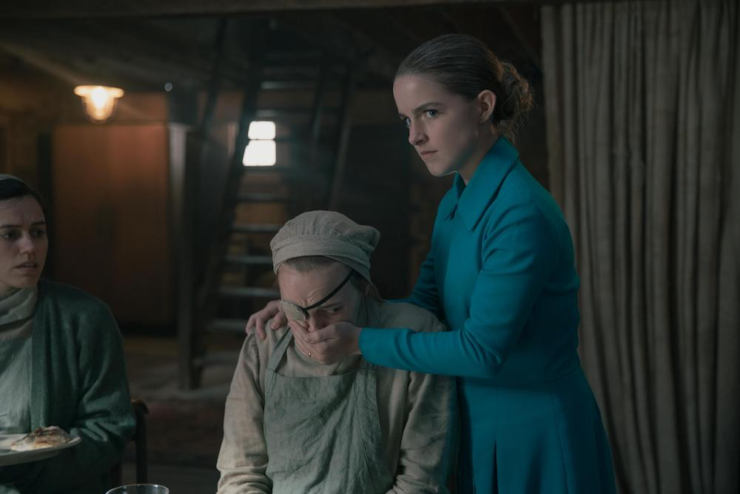
Obviously June was chosen to be a Handmaid for her proven fertility, and since her indenture, she has conceived and given birth to a second daughter. But beyond that, she has a very motherly vibe with every girl and woman she encounters, something I didn’t realize until these three episodes emphasized it. When the Handmaids are hiding from the Guardians, she’s the one to shush the others, despite gasping in pain from her gunshot wound. Later, at Esther’s farm, June ponders how “my world can’t be small, not now”—she has others to take care of, so her own comfort will have to come later.
She’s clearly projecting her need to mother both Hannah (still a child) and Nichole (still an infant) onto the other Handmaids despite them being grown-ass women; and onto fourteen-year-old Esther, who acts like a woman three times her age, with her flinty gaze and nervous smoking habit as she patrols her farm. That’s because this poor young Wife was saddled with a more-impotent-than-usual Commander of doddering old age, who allowed other Commanders and Guardians to rape her under the guise of making more children off her for Gilead’s glorious future.
June and Esther don’t slot neatly into mother and daughter proxies, however. Esther (who so resembles Kiernan-Shipka-as-Sally-Draper that casting director Sherry Thomas deserves a round of applause) starts out as June’s adoring fan, honored to be in the presence of this mythical, murderous Handmaid, and then sulky when June cautions against fully giving into rage and destroying Gilead. Of course, once she finds out about Esther’s rapes, she is happy to encourage the young Wife in slaughtering her rapists like pigs. When a blood-spattered Esther climbs into bed with June, it only works because neither is under the illusion that the other is treating her as anything but an analog for someone lost.
This only works as a brief, charged relationship. Esther’s fate is unclear by the end of the three episodes, when June returns to the farm from the local Jezebels (more on that later) to find the house raided and her fellow Handmaids having escaped. It’s unclear if Esther ratted them out, or if she was overpowered by the Guardians who came to check on them after one of their own went missing. Esther wasn’t going to be the next June; she’s more of a reminder for why June stayed in Gilead.
Angels’ Flight
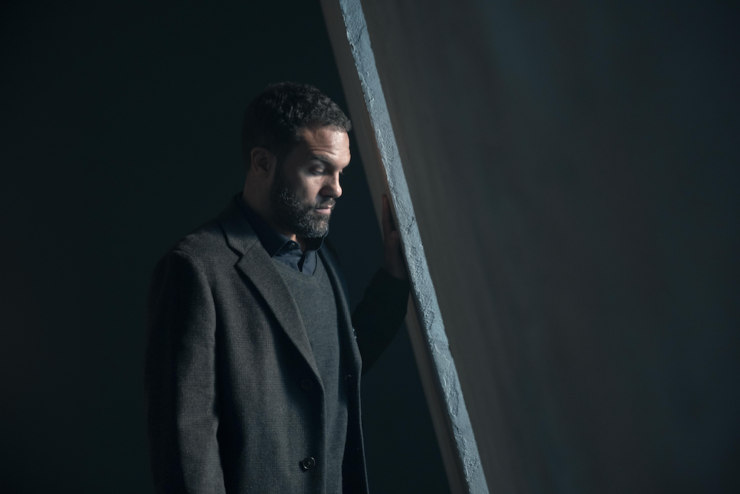
I’m so glad that season four is splitting time between Gilead and Canada, and really exploring the ramifications of what they’re calling the Angels’ Flight. Better yet, it’s Luke who’s sweet-talking potential donors at charity luncheons, appealing to their straining desire to do something about the situation down south and either reunite these children with their families or foster them in new, post-Gilead homes. The poor man has become a poster child for rebuilding every family except his own—which is honestly the best thing they could have done with the character when they decided to diverge from the book’s ambiguous-but-probably-fatal fate for him.
The series also does a good job of not making the transition easy and automatic: Most of these children are too young to remember the time before very well, so for them the separation from their adoptive parents, and the resulting culture shock of a non-Gilead way of life, is traumatic. Some of the children may even have been born in Gilead, and with no Handmaids getting out, they have neither of their biological parents in a foreign country.
Moira bringing Rita—who is herself coping with a drastic change in circumstances—to Asher’s new home to cook him dinner, Martha-style, is at first presented as a poignant way for two refugees to find comfort in the familiar. But as I think about it more, it’s also disturbing to see patterns from Gilead carried over, even on a one-off, well-meaning basis. What happens when children longing for a world that revolved around them as perfect little treasures become folded into regular society and stop getting treated like angels? I could see illicit bits of Gileadean culture crossing the border and festering in another country. But that’s long-term stuff, and for the moment the children’s adjustment feels authentically fraught.
Blessed Be the Fruit
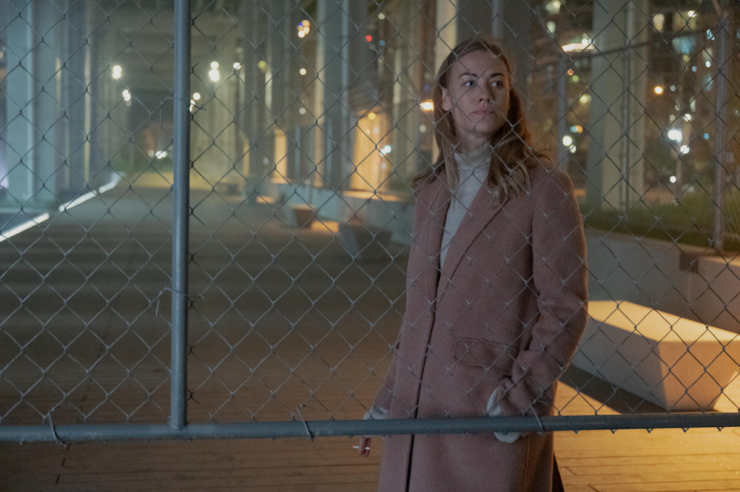
For anyone dealing with infertility, consider this a content warning for that frustrating trope of a miracle pregnancy. (Though if you’re watching this series, it’s kind of one big content warning due to the premise.) Because apparently if you get shot in the abdomen, lose all of your autonomy in the dystopia you help build, spend years having your husband rape Handmaids during their fertile windows to no avail, get your pinky chopped off for reading, hate your husband but have one night of tenderness before you betray him to Canada… you’ll finally get pregnant! After all, every infertile woman has heard “just relax and it’ll happen”—nothing like turning in your husband as a war criminal to get rid of all that stress.
Serena Joy gets the shock of her life while waiting to see if she can negotiate a dropping of the rape charges in forcing June and Nick to have sex in what eventually led to Nichole. Perhaps the fact that she’s a political prisoner while pregnant will inspire in her some sympathy for what she put June, and what Gilead puts Handmaids, through. More likely is that Serena will turn inward toward her unborn child, weighing whether it’s worth trying to start fresh with Fred (debatable considering their history and how he’s proven himself to value Gilead’s punishments over her small freedoms) or go on her own, and where getting Nichole back fits into all this.
Viewers theorized that Serena’s pregnancy would be a big part of season four back when the first trailers dropped. Redditor kweerhawk was the first to start piecing together shots, with entertainment outlets like Inverse adding to the speculation: What if Serena is the first of a new group of “Fertile Wives”? The last three seasons have made clear that Gilead’s infertility issues seem more likely to lie with the men; and if they don’t even consider having sex with their wives during their ovulatory periods, how could they know if their Wives are infertile or not?
Season two saw Serena experience some wokeness about how bad things in Gilead are for the next generation of Wives, only for her to be beaten down when her pinky was cut off for reading. Two seasons later, it looks as if she could be cycling back to this realization about just what an awful future she helped create. Perhaps this time, with a child on the way, she won’t back down.
We Are Mayday
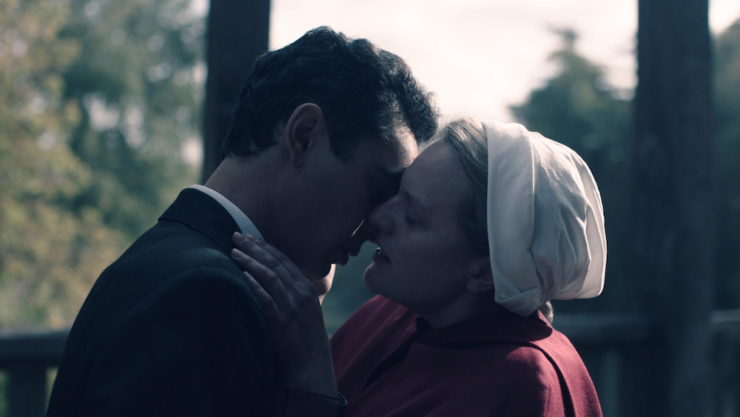
On the one hand, June’s realization that Mayday is not some mysterious organization, but rather the actions of everyday people, comes off very belated. Women of color have been doing the work for ages, and she’s joined the fight relatively recently. Yet at the same time, her saying this is less for her own sake and more to convince other women like her—the Handmaids under her care, Jezebels like Daisy, Esther—who seem to need to hear it from a celebrity rebel. If June is saying “we are the ones we’ve been waiting for,” then it will compel fellow white women to act.
For all that June’s early-season plots involved getting pregnant and giving birth (and the aforementioned figurative caretaking in lieu of the literal), there is something very satisfying in seeing her sow seeds of discord everywhere she goes. Those seeds will need to take root without her, as she gets captured by the Guardians—headed by Nick, now a Commander readying to join the war in Chicago, but not before trying to negotiate the lesser of two evils for June: torture instead of execution.
“Did June Choose This?”

Thank goodness for Luke finally asking the question! Because June goes through the wringer under the watch of a creepily civil torturer in third episode “The Crossing” (directed by Elisabeth Moss!), yet that episode loses some of its punch because we viewers know she will get past it. It’s easy, then, to adopt Luke’s stance and be frustrated with her. Twice now she has turned her back on the chance to escape Gilead; she insists on staying within the system to keep planting unrest, rather than take the opportunity to be a figurehead outside of it as its most famous refugee.
I appreciate how this season is examining the uncomfortable ramifications of June’s noble actions on her family, how Luke and Moira have to co-parent Nichole despite both having ambivalent feelings about the parental roles into which June has forced them. Luke’s putting aside of ego in raising another man’s child is commendable, but leave it to Moira and Emily to have the perfect conversation: Emily griping about June handing her her baby all “who does that?”, Moira calling June a messy bitch. This! We need more of this dismantling of an icon by the people who know her best.
Back in Gilead, two men whose allegiances are very unclear at the moment are commiserating over being led by June: Nick, who comes across as alternately passive and active, and Commander Lawrence, who seems equally likely to accept Gilead’s olive branch of reinstating him, or just take back some of his old power in order to blow things up from inside again. Yet they both have the privilege of no urgency to their actions, not even with Nick’s forthcoming deployment; their conversations about June seem more leisurely and incredibly meta, with Lawrence suggesting that “perhaps she’s fulfilled her purpose and it’s time to move on.”
Children < Power
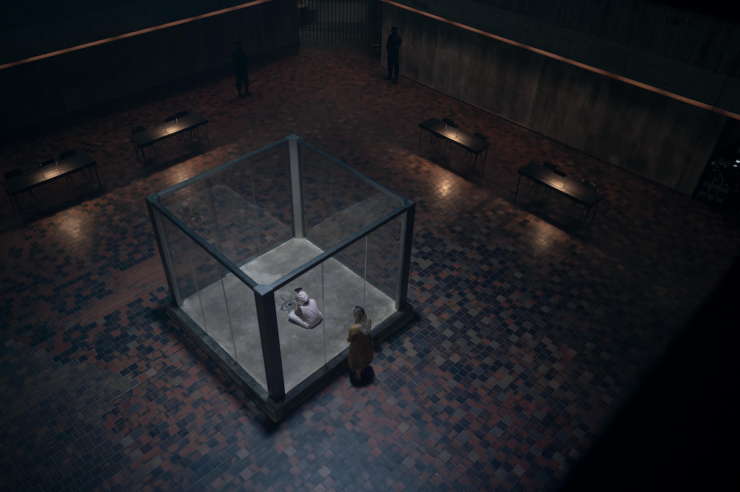
June’s torture entails burdening her with the guilt of watching the women she inspired be brutally killed: Two women (Handmaids or Marthas, it’s unclear) who are pushed over the wall because she won’t give up the location of her fellow escaped Handmaids. The moment in which June and the remaining woman silently come together in something resembling prayer was the most powerful visual in all three episodes.
And still she goes tumbling over the edge because Gilead is proving itself to be nothing but spiteful. If these two prisoners were Handmaids, that’s a waste of wombs; if they were Marthas, it’s a waste of caretakers. But as June is realizing, Gilead doesn’t really care about children, despite building its entire ideology on the fertility crisis—it cares about wielding power through whatever means necessary. In these episodes, they seem to finally be saying the quiet part out loud.
To wit, their ace in the hole, or rather in a glass cage: Hannah, a.k.a. Agnes, who only knows that she was dragged away from her adoptive family because she had to be brought to see her birth mother. It’s unclear what exactly Gilead is threatening to do to Hannah as punishment for June, but the sight of her daughter caged is enough for her to give up the location of the Handmaids. Even worse, Hannah is actively afraid of her, because she associates June with fear and danger. It’s awful to see, as it seems to have cemented June’s greatest fear: Gilead instilling itself in the next generation, even and especially if Gilead has to traumatize that next generation in order to ensure that it is not a nightmare to be shaken off, but a way of life going forward.
“Your Fault, Your Choice”
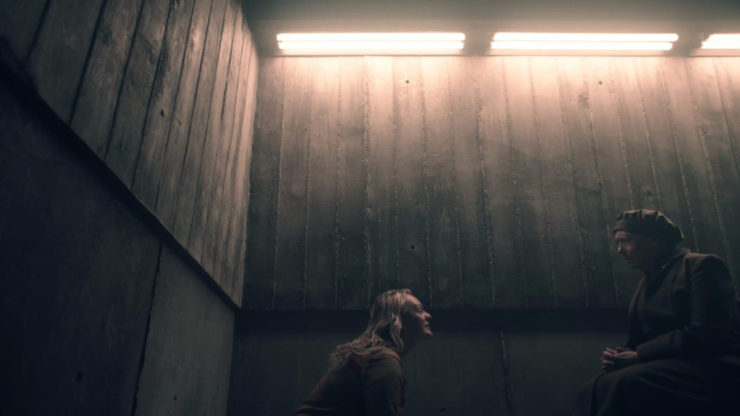
Every time that June addressed the other Handmaids as girls, or told Esther “good girl” for killing the Guardian, I couldn’t help but think of Aunt Lydia. I started to wonder if being an Aunt could be in June’s future, though of course Gilead would never let her near more impressionable young women. Barring that, then, perhaps she and Lydia would come to some sort of understanding, as the older woman has clearly been shocked by the extents to which Gilead will go.
For the moment, however, they are still on opposite sides, no doubt due to Lydia’s 19 days of “questioning” at the hands of the Guardians. She turns that pain onto June, ushering her through her torture with a mockery of maternal care. What’s great is how these two are able to turn the same insult on one another: your fault, your choice. June tries to wound Lydia by insisting how she’s failed all of the Handmaids she initially trained, how they follow June instead (again, the Aunt comparisons), but once Gilead brings in its trump card of Hannah, June seems beaten down for good.
While the men in Gilead attribute June’s apparent stupidity to stubbornness, no one seems to recognize the potential suicidal ideation she possesses. “I’m ready for it all to be over,” she tells Lydia after she has betrayed the Handmaids in favor of Hannah’s continued protection. Hannah was the reason she came back, yet their brief interaction made clear that her daughter fears life outside of Gilead’s control.
It would seem that June is ready to give up and take her own fall off the Wall, but of course Gilead won’t give that to her. Instead, she and the Handmaids she betrayed (oooof) are to be sent away to the Magdalene Colonies, where they will labor in the fields until a Commander and his Wife come to them for the monthly Ceremony. You can see how disturbingly proud of herself Lydia is for thinking this one up, and how she enjoys twisting the knife: “Your fault, your choice.”
Honestly, it was surprising that the episode didn’t make clear if the other Handmaids had been told about June’s betrayal; you’d think that that would be catnip for Lydia and co. Similarly, their escape from the armored truck seems to have somehow been silently coordinated—though of course it ends in tragedy, with Alma and two other Handmaids either shot or struck by the oncoming train. Who else thought “The Crossing” was a metaphorical title for the torture, and was then blindsided by the literal explanation of the title at the end?
That leaves June and Janine to flee from the Guardians—whether further into Gilead or toward the border, we don’t yet know. June taunts Lydia with how she got the Aunt’s wounded dog Janine to turn on her, yet being responsible for this traumatized woman will force June to decide what kind of future she wants. She still seems unable to envision a role for herself outside of being the Handmaid who fought back… yet (spoilery speculation based on trailers) we see footage of June, in non-Gilead clothes and haircut, testifying against Gilead, presumably in Canada. If that is indeed where the season is going, let’s hope it hops that narrative train sooner rather than later.
Scones & Muffins
- This section is named thusly for the baskets with which the Marthas brought offerings, along with their charges, to the Angels’ Flight last season. I’m keeping it for the moment, though I reserve the right to change should season four provide us with a new smuggling code or other pithy phrase.
- This show still brings it with the visuals: When June is being waterboarded upside-down, both her position and the embroidered cloth over her face are an inverted cross. It brings to mind the martyrdom of Saint Peter in the Bible, who was crucified like Jesus Christ, but not worthy of dying in the same fashion—the way that June doesn’t feel she deserves the same freedom as the other Handmaids, perhaps?
- I have to imagine that naming the Jezebel Daisy was a nod to Atwood’s sequel novel The Testaments, in which Daisy is the fake name given to Nichole in Canada. That Nichole never winds up in a Jezebels, though she does sneak her way back and forth between borders by pretending to be a wayward teen in need to Gilead’s guidance, and then a Pearl Girl, or Gileadean missionary, on her way to convert others.
- The Magdalene Colony is a creation of the TV series; kudos to the writers for coming up with someplace that seems to combine the worst of the (radioactive labor camp) Colonies and Jezebels. I was almost disappointed that we didn’t see June and the Handmaids there, though honestly just the description was enough to instill the appropriate fear before they made a break for it.
- “Red Leader, standing by”—who knew Janine was a Star Wars fan??
What do you want to see happen in The Handmaid’s Tale season four?
Natalie Zutter is still waiting for a music cue that will top season 2’s “Walking on Broken Glass.” Share your Handmaid’s Tale season 4 predictions with her on Twitter!










